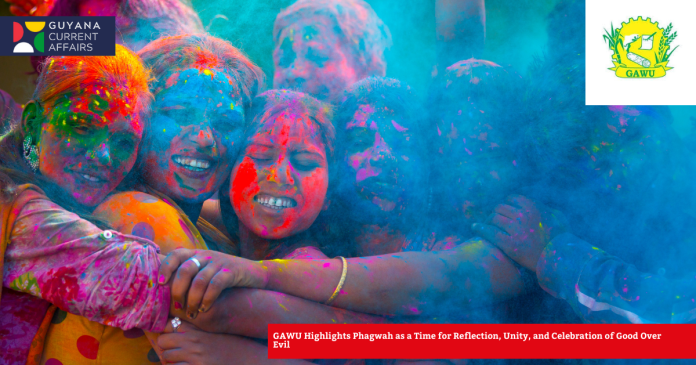As Guyana celebrated the vibrant festival of Phagwah on March 14, 2025, the Guyana Agricultural and General Workers Union (GAWU) emphasized the occasion as a remarkable opportunity for reflection, unity, and the celebration of good over evil. Phagwah, also known as Holi, is a deeply ingrained part of Guyana’s cultural heritage, symbolizing the triumph of virtue over malevolence and fostering a sense of community and togetherness.
Cultural Significance of Phagwah
Phagwah is celebrated with great fervor across Guyana, marking the victory of Prince Prahlad over his demon father, Hiranyakashyap, and his sister Holika. This mythological narrative serves as a powerful reminder of the eternal struggle between good and evil, with good ultimately prevailing. The festival is characterized by the throwing of colored powders (abrack) and water (abeer), symbolizing the vibrant colors of spring and the renewal of life.
GAWU’s Message
GAWU extended warm greetings to the Hindu community and all Guyanese, highlighting Phagwah as a celebration that transcends religious boundaries. The union noted that the festival’s message of unity and goodwill is essential for building strong foundations for future generations. GAWU emphasized that Phagwah demonstrates the power of collective efforts and cultural diversity, urging Guyanese to embrace these values to foster a more harmonious society.
Reflection and Unity
Phagwah provides a unique opportunity for reflection, allowing individuals to assess their personal and collective progress. It also serves as a catalyst for unity, bringing together people from diverse backgrounds to celebrate the universal themes of hope, renewal, and the triumph of good over evil. GAWU encouraged Guyanese to use this occasion to strengthen social bonds and promote national cohesion.
Community Participation
The festival was celebrated nationwide, with widespread participation from both Hindus and non-Hindus. This broad engagement underscores Phagwah’s role as a national celebration, reinforcing Guyana’s rich cultural tapestry and promoting social harmony.
Conclusion
As Guyana continues to celebrate Phagwah, GAWU’s message serves as a reminder of the festival’s profound significance in fostering unity and celebrating the eternal victory of good over evil. The occasion provides a powerful platform for Guyanese to come together, reflect on their shared values, and look forward to a brighter future built on the principles of diversity, integration, and cohesion.


